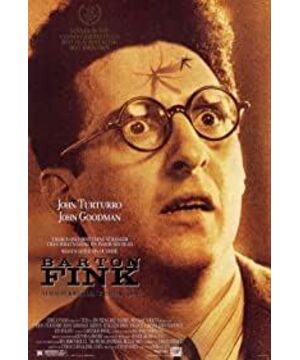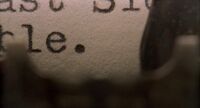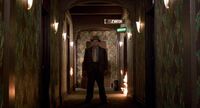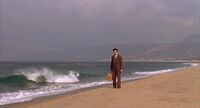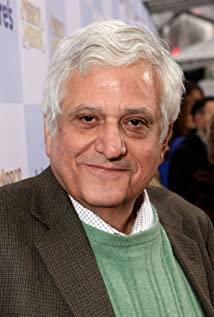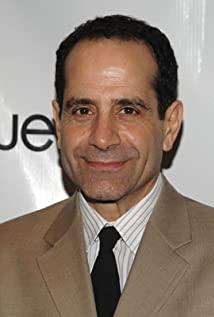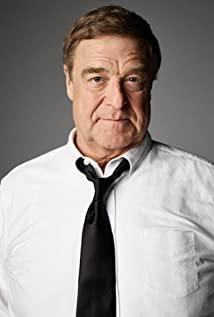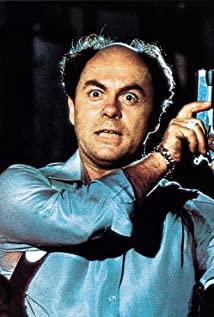It is estimated that not many people will take everything they see as fact after watching this film. If there is such a gentleman, he will probably fall asleep on the sofa or at the computer desk halfway through, and have to complain about some garbage stories after the film is over.
First of all, Patton itself is a great irony. On the surface, he has a unique view on art. He is obsessed with the dignity of art itself and is unwilling to compromise with money, but his plays are still recognized by the world thanks to the encouragement of the new bourgeoisie he despises. The further development of the industry still depends on entering Hollywood. Under the layers of contradictions and conflicts, a real Barton appeared in front of us, a poor and sour literati who pretended to be lofty, combining timidity, loneliness, and sullenness.
When he entered Hollywood, he was further on the brink of collapse. He tried to find a touch of art in business, until he ran into the novelist in the toilet. He thought he had found a life-saving straw, an old knowledge of the art world, However, that flashy novelist has long been corrupted by the Hollywood system, and Barton seems to have seen a future self. And the studio owner, who was genial for a while, willing to kneel down to lick Patton's shoes, and was promoted to general, made Patton's works worthless can also be seen as a form of dissatisfaction with the Hollywood system after the Coen brothers struggled and fought in Hollywood for many years. vent. At the same time, he is also a big hand who really dominates everything behind the scenes, and determines the fate of Patton, despite his witty appearance.
If entering Hollywood means walking into the abyss, then being invited by the boss to live in that dilapidated hotel apartment is an indispensable booster. Audiences familiar with the Hollywood model should understand what a hotel represents to a creator. Restrictions, confinement, and ultimately madness are all by-products of "hotels." (See "The Shining", "Deadly ID", "1408") Similarly, poor Patton finally surrendered his body and mind to the devil here.
The heat is hot enough to make the printed wallpaper peel off again and again, the beautiful beach seascape hanging in front of the typewriter, and the bloodthirsty mosquitoes put Barton on the scale of reality and fantasy again and again, and the seascape photo is actually the first turning point of the film. . Barton lingered again and again under the real photos, but in fact his heart had already been flying in the blue sea and blue sky that he had imagined in his mind. This sets the stage for what happens next in the hotel and sets the stage for the end of the movie. There are many illusions mixed with a little reality.
First up is Fat Charlie next door. He agreed with Patton's artistic views, and then helped him to make plans and hide the body. Obviously, Patton had developed a strong psychological dependence on Fat Charlie, and he became the only way for Patton to continue to live peacefully in real life. The only hope is the only key to reality, but in the future, with the gradual breakdown of Patton's spirit, this positive image also reflects his dark side, and he becomes a symbol of cruelty and perversion, representing death and death. Destroyed, but even at this time, he was still able to help Barton escape the shackles of the hotel, escape the roundup of the patrol police, and escape to heaven. It can be said that this is Cowardly Barton's alter ego, a positive sign.
Then came the novelist's wife. Barton tried to inquire about the novelist's writing method from her mouth, but got the news that this wife was the real behind-the-scenes lead author, instantly destroying Barton's idol status. The lonely Barton once again tried to have sex with the novelist's wife. Unexpectedly, after getting up, he pushed him to another peak of collapse. This involves the second turning point of the film, that is, the mosquito contaminated by the corpse, when I shoot it hard, reality and illusion are instantly merged, and the film also turns from a real drama to a dark absurdity. The setting of this character can be seen as Barton's physical dependence, a negative symbol.
The result of all contradictions and psychological struggles is the B-level movie script we have seen that describes wrestling. Patton wrote it as a story of one person fighting against another self. The Coen brothers finally made Patton fight against his own demons. Hidden lines merge with reality. The film achieves an unprecedented balance and unity between fantasy and reality.
View more about Barton Fink reviews


